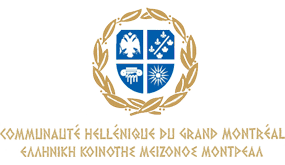How does the HCGM Fundraising Committee (FRC) operate?
 Interview with Orpheus Vosniades, FRC President
Interview with Orpheus Vosniades, FRC President
Two of the most successful Greek charity events during the winter of 2015 were the “RBC Taste and Tradition” event and the 2015 annual Raffle. The second edition of the Greek-traditional-food fest raised more than $ 62,000, while the estimated net proceeds from the 2015 Raffle are over $ 100,000, totalling more than $ 162,000 that will benefit the HCGM schools through the FRC.
What is the FRC? What is its story and who are the people behind it? How does the FRC raise funds to help finance the various school projects?
The FRC was formed in 1998, following a decision of the HCGM Board of Directors and then motioned for approval at a General Assembly by a proud member of the Community, the late Evangelos Hatzis. At the time, the Hellenic Community of Montreal was in need of funds to aid with the payments of a bank loan from the Caisse de dépôt et placements du Québec; this being the main reason behind the founding of the FRC. The late Evangelos Hatzis, the first President of the FRC, held the position for two years. The FRC is a self-governing Committee of the HCGM, administered by its own four-member Executive Committee and between eight to fifteen Committee members – all of whom are hardworking volunteers. In 1999, Orpheus Vosniades succeeded the late Evangelos Hatzis and has been the FRC President ever since.
The Executive Committee is composed of Tassos Xipolitakis, Panagiotis Tzimas and George Koufalis, Vice President, Secretary and Treasurer respectively. Proud members of the Committee are Voula Ambelakiotis, John Manikis, Vrissis Mavrou-Paidoussis, Spyros Montzenigos, Christos Papachristopoulos, Stavros Tsinalis, Dimitrios Xenos, Demetris J. Yantsulis and Theofanis Damoulis.
Mr. Vosniades was born in Athens, Greece and came to Canada to complete his studies, first at the University of Ottawa and subsequently at McGill University in Montreal. In 1958 he graduated with a degree in mechanical engineering. That same year he joined Shell Canada Limited where he spent his entire professional career. He retired in 1988, as Manager of Engineering at the Montreal East Refinery. Subsequently, he was involved in projects in Kuwait, and Irving Oil in New Brunswick, as Project Manager.
Since its formation, the FRC has raised more than $ 4,000,000 from various events such as the “Radio Marathon” and the “Raffle”. Mr. Vosniades explains: “The activities are organised by the members of the Committee – all of whom are volunteers – with the help of a part-time assistant who is the only paid individual. Their involvement and requests for participation and assistance from the compatriots of Montreal are done through mail, emails and the use of Hellenic mass and social media. The most important element is the personal contact by the FRC members in soliciting donations and/or purchasing raffle tickets”.
How do you decide which projects to finance, and what procedures are followed?
Orpheus Vosniades: “The selection of the projects to be financed from the funds collected by the FRC is made on a priority basis by a Committee, the members of which include the Secretaries of the HCGM Board of Directors responsible for Education, for Supplementary Education and for Real Estate, as well as the acting Executive Director, the École Socrates-Démosthène General Director, the Director of Real Estate and the FRC President or a representative from the FRC”.
What are the FRC’s future plans? Will it continue to fundraise for our schools?
Orpheus Vosniades: “The FRC needs to continue its activities and provide financial assistance. Although the HCGM provides ever-increasing support and improvement to our school buildings and facilities, as well as, technical support (information technology), additional funds need to be raised to sustain all of the above. The FRC is in need of new members to continue and expand its activities, and to explore new and different opportunities. The human–resource element is of paramount importance to the continuing and effective functioning of the FRC”.




